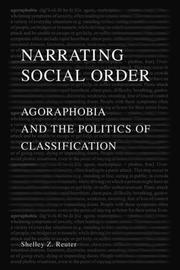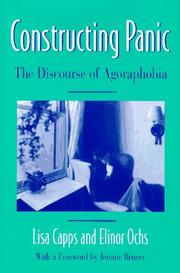| Listing 1 - 6 of 6 |
Sort by
|
Book
ISBN: 0191740268 0191004251 9780191004254 1306300436 9781306300438 019100426X Year: 2014 Publisher: New York, NY Oxford University Press
Abstract | Keywords | Export | Availability | Bookmark
 Loading...
Loading...Choose an application
- Reference Manager
- EndNote
- RefWorks (Direct export to RefWorks)
Panic disorder is characterized by sudden, unexpected attacks of intense fear and anticipatory anxiety. Panic attacks include symptoms such as palpitations, dyspnoea, dizziness, trembling, gastrointestinal discomfort and fear of dying. Therefore, patients with panic disorder often assume physical illnesses may underly their symptoms. They frequently consult psychiatrists and psychologists, but also general practitioners, cardiologists, neurologists and other medical specialists. Part of the Oxford Psychiatry Library series, this pocketbook will serve as a concise and practical manual for the m
Panic disorders --- Panic attacks --- Agoraphobia --- Fear of being alone --- Fear of open space --- Fear of open spaces --- Isolation, Fear of --- Open space, Fear of --- Open spaces, Fear of --- Phobias --- Spatial behavior --- Anxiety attacks --- Attacks, Panic --- Panic (Psychology) --- Fear --- Diagnosis. --- Treatment.
Multi
ISBN: 9070879824 Year: 1987 Publisher: Groningen
Abstract | Keywords | Export | Availability | Bookmark
 Loading...
Loading...Choose an application
- Reference Manager
- EndNote
- RefWorks (Direct export to RefWorks)
Agoraphobia --- Marriage. --- Married life --- Matrimony --- Nuptiality --- Wedlock --- Love --- Sacraments --- Betrothal --- Courtship --- Families --- Home --- Honeymoons --- Fear of being alone --- Fear of open space --- Fear of open spaces --- Isolation, Fear of --- Open space, Fear of --- Open spaces, Fear of --- Panic disorders --- Phobias --- Spatial behavior --- Theses --- Agoraphobia. --- Marriage
Book
ISBN: 9026504071 Year: 1982 Publisher: Lisse : Swets & Zeitlinger,
Abstract | Keywords | Export | Availability | Bookmark
 Loading...
Loading...Choose an application
- Reference Manager
- EndNote
- RefWorks (Direct export to RefWorks)
Agoraphobia --- Phobias --- Social isolation --- Exclusion, Social --- Isolation, Social --- Social exclusion --- Social psychology --- Alienation (Social psychology) --- Social distance --- Fear of being alone --- Fear of open space --- Fear of open spaces --- Isolation, Fear of --- Open space, Fear of --- Open spaces, Fear of --- Panic disorders --- Spatial behavior --- Phobic disorders --- Phobic neuroses --- Fear --- Neuroses --- Theses --- Psychiatry --- Psychiatrie.

ISBN: 1442684658 9781442684652 9780802090881 0802090885 Year: 2007 Publisher: Toronto
Abstract | Keywords | Export | Availability | Bookmark
 Loading...
Loading...Choose an application
- Reference Manager
- EndNote
- RefWorks (Direct export to RefWorks)
Agoraphobia, the fear of open spaces, has received minimal attention from sociologists. Yet implicit within psychiatric discussion of this disease is a normative account of society, social order, social ordering, and power relations, making agoraphobia an excellent candidate for sociological interpretation. Narrating Social Order provides the first critical sociological framework for understanding agoraphobia, as well as the issue of psychiatric classification more generally.Shelley Z. Reuter explores three major themes in her analysis: agoraphobia in the context of gender, race, and class; the shift in recent decades from an emphasis on psychoanalytic explanations for mental diseases to an emphasis on strictly biogenic explanations; and, finally, embodiment as a process that occurs in and through disease categories. Reuter provides a close reading of reports of agoraphobia beginning with the first official cases, along with the DSM and its precursors, illustrating how a ?psychiatric narrative? is contained within this clinical discourse. She argues that, while the disease embodies very real physiological and emotional experiences of suffering, implicit in this fluid and shifting discourse are socio-cultural assumptions. These assumptions, and especially the question of what it means, both medically and culturally, to be ?normal? and ?pathological,? demonstrate the overlap between the psychiatric narrative of agoraphobia and socio-cultural narratives of exclusion. Ultimately, Reuter seeks to confront the gap that exists between sociological and psychiatric conceptions of mental disease and to understand the relationship between biomedical and cultural knowledges.
Agoraphobia. --- Mental illness --- Social psychiatry. --- Agoraphobie. --- Maladies mentales --- Psychiatrie sociale. --- Psychiatry, Social --- Clinical sociology --- Mental health --- Psychiatry --- Social medicine --- Social psychology --- Psychology, Pathological --- Nosology --- Fear of being alone --- Fear of open space --- Fear of open spaces --- Isolation, Fear of --- Open space, Fear of --- Open spaces, Fear of --- Panic disorders --- Phobias --- Spatial behavior --- Classification. --- Agoraphobie --- Psychiatrie sociale --- Classification

ISBN: 0674165489 Year: 1995 Publisher: Cambridge (MA) ; London : Harvard University Press,
Abstract | Keywords | Export | Availability | Bookmark
 Loading...
Loading...Choose an application
- Reference Manager
- EndNote
- RefWorks (Direct export to RefWorks)
Agoraphobia --- -Discourse analysis --- Discourse analysis, Narrative --- Panic attacks --- Personal construct theory --- #psyc:gift 1996 --- Personal construct psychology --- Personality --- Psychology --- Repertory grid technique --- Anxiety attacks --- Attacks, Panic --- Panic (Psychology) --- Fear --- Panic disorders --- Narrative discourse analysis --- Narration (Rhetoric) --- Discourse grammar --- Text grammar --- Semantics --- Semiotics --- Fear of being alone --- Fear of open space --- Fear of open spaces --- Isolation, Fear of --- Open space, Fear of --- Open spaces, Fear of --- Phobias --- Spatial behavior --- Case studies --- Discourse analysis --- Discourse analysis.

ISBN: 0674029186 9780674029187 0674165489 9780674165489 9780674165496 0674262492 0674165497 9780674262492 Year: 1995 Publisher: Cambridge, Massachusetts
Abstract | Keywords | Export | Availability | Bookmark
 Loading...
Loading...Choose an application
- Reference Manager
- EndNote
- RefWorks (Direct export to RefWorks)
Meg Logan has not been farther than two miles from home in six years. She has agoraphobia, a debilitating anxiety disorder that entraps its sufferers in the fear of leaving safe havens such as home. Paradoxically, while at this safe haven, agoraphobics spend much of their time ruminating over past panic experiences and imagining similar hypothetical situations. In doing so, they create a narrative that both describes their experience and locks them into it. Constructing Panic offers an unprecedented analysis of one patient's experience of agoraphobia. In this novel interdisciplinary collaboration between a clinical psychologist and a linguist, the authors probe Meg's stories for constructions of emotions, actions, and events. They illustrate how Meg uses grammar and narrative structure to create and recreate emotional experiences that maintain her agoraphobic identity. In this work Capps and Ochs propose a startling new view of agoraphobia as a communicative disorder. Constructing Panic opens up the largely overlooked potential for linguistic and narrative analysis by revealing the roots of panic and by offering a unique framework for therapeutic intervention. Readers will find in these pages hope for managing panic through careful attention to how we tell the story of our lives.
Agoraphobia --- Personal construct theory. --- Discourse analysis. --- Discourse analysis, Narrative. --- Panic attacks. --- Anxiety attacks --- Attacks, Panic --- Panic (Psychology) --- Fear --- Panic disorders --- Narrative discourse analysis --- Narration (Rhetoric) --- Discourse grammar --- Text grammar --- Semantics --- Semiotics --- Personal construct psychology --- Personality --- Psychology --- Repertory grid technique --- Fear of being alone --- Fear of open space --- Fear of open spaces --- Isolation, Fear of --- Open space, Fear of --- Open spaces, Fear of --- Phobias --- Spatial behavior --- PSYCHOLOGY / Psychopathology / Anxieties & Phobias.
| Listing 1 - 6 of 6 |
Sort by
|

 Search
Search Feedback
Feedback About UniCat
About UniCat  Help
Help News
News